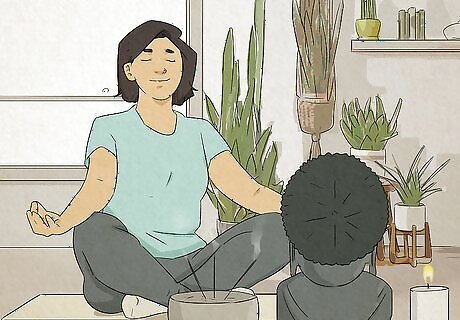
views
Following the Noble Eight Fold Path

Meditate regularly. Meditation is the key to changing how your mind works and will allow you to travel the path to nirvana. It should be a part of your everyday life. While you can learn to meditate on your own, a teacher can help guide you and apply proper techniques. You can meditate alone, but it is helpful to meditate with other people and under the guidance of a teacher. You cannot travel the path without meditating. Meditation will help you better understand yourself and the world.

Have the right view. The Buddhist teachings (i.e. The Four Noble Truths) are the lens that you view the world through. If you are unable to accept the teachings, you will not be able to follow the other steps in the path. The right view and the right understanding is the foundation of the path. See the world as it really is and not as you would like for it to be. You seek to understand reality completely and through an objective lens. This requires you to examine, study, and learn. The Four Noble Truths are the basis of the right understanding. You must believe that those truths describe things as they really are. Nothing is perfect or permanent. Think critically about situations instead of inserting your personal feelings, desires, and concerns.

Have right intentions. Commit yourself to developing an attitude that is line with your belief system. Act as if all life is equal and deserves to be treated with compassion and love. This applies to yourself and to others. Reject thoughts that are selfish, violent, and hateful. Love and non-violence should be the rule. Show regard for all living things (e.g. plants, animals, and people) regardless of their status. For example, you would treat a wealthy person and poor person with the same respect. People from all backgrounds, age groups, races, ethnicity, economic groups should be treated equally.

Speak the right words. The third step is the right speech. When practicing the right speech, you do not lie, slander, gossip, or speak harshly. Instead you speak kind and truthful words. You words should affirm and uplift others. Knowing when to be silent and holding back your words is also important. Having the right speech is something you practice every day.

Have the right action. Your actions flow out of what is in your heart and in your mind. Treat yourself and other people well. Do not destroy life or steal. Live a peaceful life and help other people live peaceful lives as well. Be honest when you deal with other people. For example, you would not deceive or lie to get ahead or get something that you want. Your presence and actions should be positive and improve the lives of other people and society.

Choose a right Livelihood. Choose a profession that is in agreement with your beliefs. Do not have a job that harms other people, involves killing animals, or cheating. Selling weapons, drugs, or working at a slaughterhouse are not acceptable occupations. Whatever profession you choose, you must carry it out with integrity. For example, if you work in sales, you would not use deception or lies to get people to purchase your product.

Practice the right effort. Putting true effort into anything that you do will lead to success. Rid your mind of negative thoughts and focus on positive thinking. Have enthusiasm for whatever you do (e.g. school, career, friendships, hobbies etc.). You have to consistently practice having positive thoughts as this does not always come naturally. This will prepare your mind to practice mindfulness. The four tenets of right effort are: Prevent evil and unwholesome states (sensual desire, ill will, worry, doubt, restlessness) of from arising Get rid of evil and unwholesome states that have already arisen by countering them with good thoughts, redirecting your attention to something else, or confronting the thought and investigating the source of the thought. Produce good and wholesome states Maintain and perfect the good and wholesome states

Practice Mindfulness. Mindfulness allows you to see reality and see things as they really are. The four foundations of mindfulness are contemplation of body, feelings, states of mind, and phenomena. When you are mindful, you live in the moment and are open to the entire experience. You focus on your present situation not on the future or the past. Be attentive to your body, your feelings, your thoughts, your ideas, and everything around you. Living in the present frees you desires from your future and past. Mindfulness also means being attentive to other people's feelings, emotions, and body.

Focus your mind. Right concentration is the ability to focus your mind on a single object and not be distracted by outside influences. Going through the other parts of the path will allow you concentrate. Your mind will be focused and not filled with stress and anxiety. You will have a good relationship with yourself and the world. Right concentration allows you to view something clearly and as it truly is. Concentration is similar to mindfulness. However, when you concentrate you are not aware of all of the different sensations and feelings. For example, if you are concentrating on an exam, you are only focused on taking the exam. If you were practicing mindfulness during the exam, you would notice how you felt taking the exam, how the other people around you were acting, or how you were sitting during the exam.
Attaining Nirvana in Your Everyday Life

Practice Loving Kindness (metta bhavana). Metta means non-romantic love, kindness,and friendliness. It is a feeling that comes from your heart, and it has to be cultivated and practiced. It is usually practiced in five stages. If you are a beginner, try to stay in each stage for five minutes. Stage 1- Feel metta for yourself. Focus on feelings of peace, tranquility, strength, and confidence. You can repeat the phrase "May I be well and happy." to yourself. Stage 2- Think of a friend and all of the things that you like about them. Repeat the phrase, "May they be well; may they be happy." Stage 3- Think of someone that you are neutral about. You do not like them or dislike them. Consider the person's humanity and extend your feelings of metta to that person. Stage 4- Think of someone that you do not like at all. Instead of thinking about why you do not like them and having hateful thoughts, send your feelings of metta to them. Stage 5- In this last stage, think of every single person including yourself. Send metta to those people, your city, your neighborhood, your country, and the entire world.

Practice Mindfulness of Breathing. This type of mediation will teach you to concentrate and focus your thoughts. Through this mediation you can learn to practice mindfulness, relax, and rid yourself of anxiety. Find a sitting position that is comfortable for you. Your spine needs to be upright and relaxed. Your shoulders should be relaxed and slightly rolled back and down. Support your hands on a cushion or in your lap. Once you have your posture, begin going through the different stages. Each stage should last for at least 5 minutes. Stage 1- Count internally (breathe in, breathe out, 1 breathe in, breathe out 2, etc.) after each breath until you reach 10. Start over once you have reached 10. Focus on the sensations of breathing in and out. Your mind will wander. Just bring your thoughts back to your breathing. Stage 2- Continue to breathe in cycles of 10, but count before you inhale this time (e.g.,1, breathe in, breathe out, 2, breathe in, breathe out, 3, etc.). Focus on the sensations you have when you are inhaling. Stage 3- Breathe in and out without counting. Try to see your breathing as a continuous process instead of just breathing in and breathing out. Stage 4- Your focus should now be in the sensations of your breath as it enters and leaves your body. This may be your breath passing over your nostrils or your upper lip.

Affirm and uplift others. The ultimate goal of Buddhism is to achieve inner peace and then share your experience with other people. Attaining nirvana is not only for your benefit, but for the world as well. It is important for you to be a source of encouragement and support for others. This is as simple as giving someone a hug if he or she is feeling down. If someone is important to you or does something nice for you, let the person know how you feel. Let people know that you are grateful for them and appreciate them. If someone is having a bad day, provide a listening ear.

Treat people with compassion. Your happiness is directly related to the happiness of other people. Showing compassion promotes happiness for all. You can practice compassion in many ways: Turn off your cell phone when you are spending time with friends and family. Make eye contact when someone is talking to you and listen without interrupting. Volunteer in your community. Open doors for other people. Be empathetic towards people. For example, if someone is upset, acknowledge and try to understand why they are upset. Ask them what you can do to help. Listen and show concern for their feelings.

Be mindful. When you practice mindfulness, you pay attention to how you think and feel in the present moment. Mindfulness is not only for meditation but for your every day life as well. For example, you can be mindful as you eat, shower, or get dressed in the morning. Start by choosing one activity and then focus on the sensations in your body and your breathing as you do it. If you want to mindful while you are eating, concentrate on the taste, texture, and smell of the food as you eat it. As you wash the dishes, pay attention to the temperature of the water, how your hands feel as you clean the dishes, and how the water feels as you rinse the dishes. Instead of listening to the music or the television as you get dressed in the morning, get ready in silence. Notice how you feel. Were you tired or well rested when you woke up? How does your body feel as you put on clothes or shower?
Navigating the Four Truths

Identify suffering. Buddha describes suffering differently than you may usually think of it. Suffering is inevitable and is a part of life. Dukkha is the truth that all is suffering. Suffering is typically used to describe things such as sickness, aging, accidents, and physical and emotional pain. Yet, Buddha considers desires(i.e. especially unfulfilled desires) and cravings as suffering as well. These two things are considered the roots of suffering because humans are rarely ever satisfied or content. Once one desire is met, another desire is created. This is a vicious cycle. Dukkha means "that which is difficult to bear." Suffering is a large spectrum and includes things that are great and small.

Determine the cause of suffering. Desire and ignorance are the root of suffering. Your unfulfilled desires are the worst type of suffering. For example, if you are sick, you are suffering. While you are sick, you desire to be well. Your unmet desire to be well is a greater form of suffering than just being sick. Any time you desire a thing, opportunity, person, or achievement that you cannot have, you are suffering. The only guarantees in life aging, sickness, and death. Your desires will never be satisfied. Once you achieve or get something that you want, you will begin to desire something else. Your constant cravings keep you from achieving true happiness.

End suffering in your life. Each of the four truths is a stepping stone. If all is suffering and suffering comes from your desires, then the only way to end suffering is by no longer having desires. You must believe that you do not have to suffer and that you have the ability to stop the suffering in your life. To end the suffering in your life, you must change your perception and learn to control your desires. Controlling your desires and cravings will allow you to live with freedom and contentment.

Attain the end of suffering in your life. The end of suffering can be attained by traveling the Noble Eightfold Path. Your path to nirvana involves can be summed up by three ideas. First, you have to to have the right intentions and mindset. Secondly, you have to live out your right intentions in your everyday life. Lastly, you have to understand true reality and have the correct beliefs about all things. The eightfold path can be divided into three categories: wisdom (right view, right intention), ethical conduct (right speech, right action, right livelihood), and mental cultivation (right effort, right mindfulness, right concentration). This path offers guidelines for how to live your everyday life.














Comments
0 comment